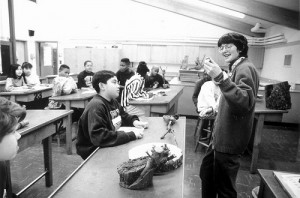
Flickr:Seattle Municipal Archives

Flickr:Seattle Municipal Archives
By Ana Tintocolos
Talia Ortega, a fifth-grade teacher, and Katie Burns, a sixth-grade teacher, are the two educators at the center of a school transformation at Nightingale Elementary School in the Stockton Unified School District in Northern California. They both enrolled in Teachers College of San Joaquin after feeling frustrated with Nightingale’s boilerplate practices.
They say the hallmarks of the new Nightingale will be based on a teaching philosophy that incorporates 21st-century learning, encouraged at Teachers College.
Ortega and Burns say it boils down to this: Nightingale will keep its core academic subjects – reading, math, science, history. But instead of teachers drafting their own lesson plans in isolation, the entire teaching staff will collaborate to build a learning plan that taps into a career theme using hands-on projects and/or technology in their class.
For example, if Nightingale teachers collectively decide that health will be the school’s academic focus for the month of June, then a week of instruction might look like this: Student read biographical books about cancer survivors in English class; they create an interactive timeline of cancer treatment discoveries in history class; they understand oncology counts in math; and finally there might be a visit to a nearby cancer research center for science class.

